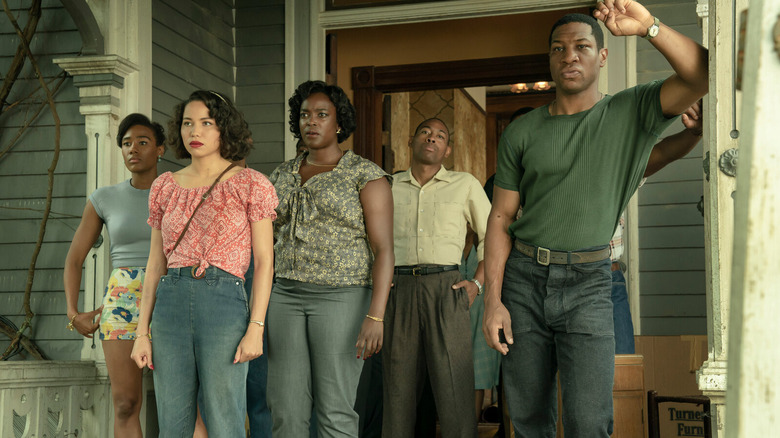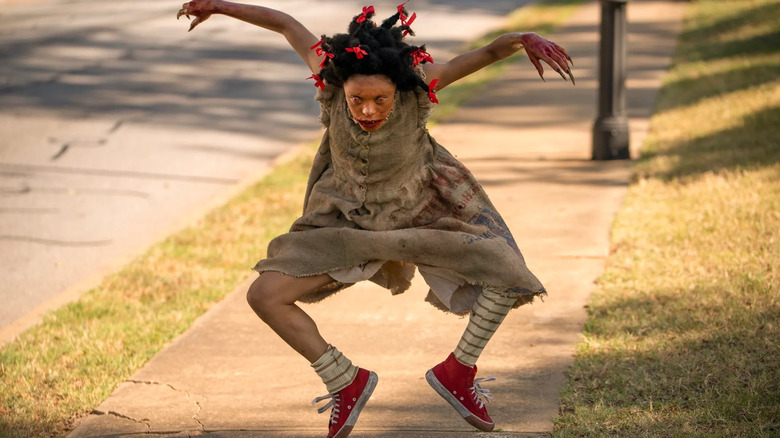HBO Canceled This Hit Horror Show Without Reason (But That Might Have Been For The Best)
It's rare for a TV series to find its footing the moment it hits the ground. Personally, some of my favorite shows of all time (be they "Halt and Catch Fire" or "Star Wars Rebels" — my tastes are nothing if not eclectic) were clearly uncertain about what they even wanted to be in their first seasons. Even Peak TV touchstones like "Mad Men" are far more clunky and ham-fisted in their earliest episodes than you might recall. Really, the list of cherished small screen titles that got off to a rocky start goes on and on. (Just ask your local Trekkie sometime about the first season of "Star Trek: The Next Generation" ... but maybe set an hour aside before you do.)
This is also what makes all those unexpectedly short-lived shows out there fascinating "what ifs," perhaps few more so than Misha Green's wildly ambitious HBO series adaptation of Matt Ruff's literary smorgasbord of Black history, horror, sci-fi, and fantasy, "Lovecraft Country." As its title and description suggest, both Ruff's 2016 novel and Green's small screen reinterpretation aim to correct the horrific racism of H.P. Lovecraft's work while at the same time embracing the highly influential writer's wondrously weird outlook and shining a light on the dark truths of U.S. history. Given that daunting task, perhaps it's no surprise the first season of Green's "Lovecraft Country" series was a mosaic of spectacular images and concepts yet riddled by under-examined ideas, under-developed plot threads, and unsatisfying character arcs. At its worst, the series was guilty of connecting its plot to real historic events "in ways that were equal parts awkward and galling," as The Ringer's Lex Pryor put it.
Still, with the show earning strong reviews in the early going and generating sturdy ratings for an HBO original, there was fair reason to hope "Lovecraft Country" would fully come into its own in a second season after covering the entirety of Ruff's book. Indeed, shortly after the first season wrapped, Green told Deadline she had already mapped out another season that would continue to "reclaim the genre storytelling space that people of color have typically been left out of." So, why didn't it come to pass? The answer, much like the series itself, is heartbreaking and frustrating all at once.
Much of what's happened since HBO axed Lovecraft Country has left a stain on the show
Set against the backdrop of the Jim Crow-era U.S. in the 1950s (a time and place as scary as anything Lovecraft ever imagined), "Lovecraft Country" season 1 focuses on the adventures of genre fiction-loving Korean War veteran Atticus "Tic" Freeman (Jonathan Majors) and his family, friends, and various associates. Right away, you can see at least one reason why, looking back now, HBO execs are probably relieved they canceled the series in July 2021, with Majors having since been found guilty of harassment and assault in a court of law.
Prior to his conviction, a bombshell report from Rolling Stone also revealed several additional allegations against Majors, accusing him of abusive and toxic behavior in both his personal life and professional environments as an actor. Mind you, this all came out after the publication of the 2021 book "Tinderbox: HBO's Ruthless Pursuit of New Frontiers." There, author/reporter James Andrew Miller published allegations from "people who worked on the show and people who represented people on the show" that the environment on the "Lovecraft Country" set "was not a healthy one," as Miller informed The Hollywood Reporter at the time of the book's release. Based on Miller's investigation, this was why HBO elected to axe the series without providing a reason beyond vague corporate-speak. As if that weren't enough, character actor extraordinaire and "Lovecraft Country" co-star Michael K. Williams (who was as compelling as ever in the role of Tic's emotionally-damaged father, Montrose) then died from an accidental drug overdose two months after the show was canned.
Was Majors the real problem all along? Were there other issues with how Green ran the show? Frankly, it feels irresponsible to speculate on the matter. All one can say is that the series' brutal, unflinching depiction of the real-life horrors of prejudice tapped directly into the zeitgeist of Black Lives Matter protests when it aired in the summer of 2020 ... but it was also a project where it felt like its creator didn't have control of the steering wheel. Then again, to quote Pryor once more, perhaps what matters most is that a Black woman like Green "was actually given the space to shoot for the moon rather than the fact that she often missed." Perhaps that's what will truly lead to something better in the future.

